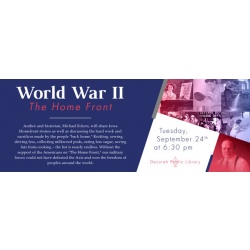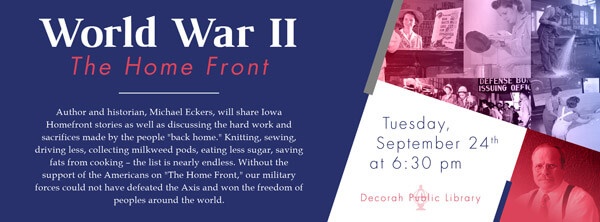
EXCLUSIVE INTERVIEW: Regional historian articulates the WWII Home Front experience
(by decorahnews.com's Ben Gardner):
Join historian Michael Eckers at 6:30 p.m. Tuesday September 24th at Decorah Public Library to learn about the hard work and sacrifices of the folks "back home" who toiled to support the troops fighting overseas in a variety of ways, both large and small, during World War II.
Ecker's presentation, "World War II – The Home Front," focuses on the personal and nationwide fight against a common enemy through resource rationing, recycling, scientific and industrial innovation, and financial contributions. From elementary students to the senior citizens, all Americans had a part to play: knitting, sewing, driving less, collecting milkweed pods, saving fats from cooking, eating less sugar- and more.
Eckers is an historian and author who has studied American history for more than 50 years. He is retired from Federal service, including four years in the U.S. Navy during the Vietnam era. Eckers lived in southern Minnesota for most of his life and recently began traveling the country, speaking and writing. He is an active supporter of numerous historical and veterans groups in the Midwest and Florida and has published four books.
The following is interview between decorahnews.com's Ben Gardner and historian Michael Eckers.
Ben Gardner: Describe the way an average Midwestern family would make daily sacrifices to the war effort?
Michael Eckers: On a daily basis, Americans were subject to rationing of items we considered basics, even then. Sugar, coffee, fats, meats, gasoline, shoes, car tires. Some items were not even manufactured for civilian consumption such as automobiles and refrigerators. The war effort caused companies to retool for military items; Gibson Refrigerator in Greenville, Michigan made aluminum tubing for Waco glider frames in lieu of tubing for cooling units. Singer Sewing also made .50 caliber machine guns; General Mills made cocking levers for anti-aircraft guns. The biggest example might be Ford Motor Company's Willow Run plant in Ypsilanti, Michigan turning out a B-24 bomber every 52 minutes by the end of the war.
Ben Gardner: Describe how a sacrifice on the American home front would impact the international war effort?
Michael Eckers: Young people were set to collecting scrap paper, metal and other items to recycle and reuse. Meat fats were collected for use in explosives, milk weed pods were collected throughout the Midwest for use as a flotation in life jackets for the hundreds of thousands sailors and Marines in the Pacific. Meatless Tuesdays on the West Coast meant you could not buy meat in a restaurant unless you were in uniform; salads became fashionable. Women went to work in numbers unheard of before; they liked it and our government created the GI Bill to help accommodate the needs of the millions of men returning from the war, creating the opportunity for better lives all around. It was a social change as big as any other in our history.
Ben Gardner: Did other Allied forces have similar home front efforts? Most fighting took place outside America, did this influence America's ability to maintain a solid, sacrificial home front?
Michael Eckers: The use of Victory Gardens, growing our own fresh vegetables, not only focused attention at home on supporting the war effort. It also helped in creating a surplus of foodstuffs for our allies, and for those we began to free through military victories against the Axis. America was, quite literally, helping to feed the world. More than a million pounds of canned meat, think Spam, were shipped to the Soviet Union, along with thousands of trucks, jeeps, airplanes, and tons of other war materiel. Britain may well have starved without our food production. As much as our soldiers, sailors, airmen and Marines were needed to defeat the enemy; our potatoes, hogs, sheep, cows, apples, wheat, corn, hemp, cotton, steel, synthetic rubber, gasoline were essential for victory. Each American helped with providing through production or reduced consumption.
Michael Eckers: Our Allies, fighting on their own soil or also assisting, had varied degrees of rationing. I think, mostly, they simply did not have what they needed. England had her empire to help; Australian, New Zealand, South African and Indian troops fought all over the world and helped with supplies through their own systems of rationing and increased production, when possible. The simple fact is that ONLY the United States, with our isolated position; protected by thousands of miles of ocean, could become the Arsenal of Democracy. The iron ore mines of Minnesota, coupled with coal from West Virginia, created unimaginable amounts of steel in our mills. We built submarines in Wisconsin because it was a safe place in the middle of the country.
Ben Gardner: Describe the national system of organizing and maintaining this home front effort. To what extent was federal, state, and local government involved?
Michael Eckers: Our national, state and local governments worked together, pretty well, with such a focused mission in mind. Cities challenged each other in scrap drives, there were prizes for the cities with the best Victory Garden programs, the FDA and USDA sponsored large home food canning programs. Our government, in a way, became "big government" in the oversight of a huge number of programs supporting the war effort; not because in wanted to.... it had to.
Simply put... the daily involvement and sacrifice of each and every American brought about Allied victory. America's Greatest Generation extended far beyond those in uniform.
Ben Gardner: Describe your family's experience during World War II.
Michael Eckers: My father served in the Eighth Air Force in England and my mother had a special position escorting a high ranking Royal Air Force officer through American industry. One of my books is about their time during The War. The only stories I remember from my family on the home front concern my dad's parents. My grandfather had served in WW1 and was one of the lead printers for the Minneapolis Tribune newspaper. His job allowed him an increased gasoline ration and he used it to help others in his neighborhood during those years; he had also been one of a few folks to hold a job throughout the Depression so his benevolence extended through most of a decade or longer. Grandpa and Grandma always had a large garden, threw away almost nothing and repaired, patched, reused and recycled most things. I like to think of them as part of a core of society that was really prepared for the conflict. I do remember my Grandpa once telling me that World War II was another hurdle in his life's race; something to get over.
Site designed and maintained by Iroc Web Design Services©.
Your Small Business Web Design Solutions.™


